

Adelheid Visiting - May 2025
| Adelheid Visiting - May 2025 | |
|
May rolled around and we were happy to welcome Adelheid for a visit to Burnham-on-Sea.
Amazingly, this is the first visit since we lived in Denmark.
It was difficult to make the day pass quickly while waiting for Adelheid to arrive. So we did some gardening - laying down a non-circular and hopefully decorative group of flag stones. This included using an axe to chop at old tree roots that were in our way. | |
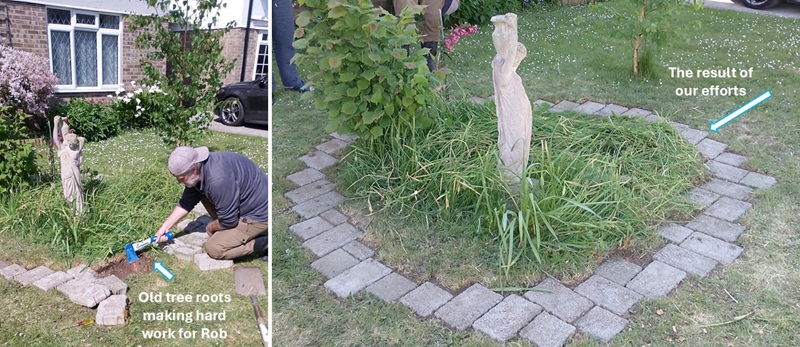
|
|
| Finally, in the late evening, we could pick Adelheid up at Bristol airport. And we didn't have many hours sleep before we did our usual morning walk through Apex Park. At this time of year there were plenty of blossoming hawthorn trees - making us even happier! | |
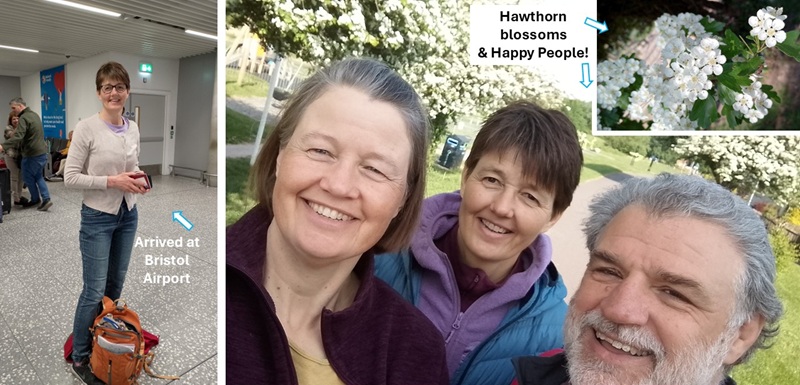
|
|
| Of course, we stopped by the "Burnham-on-Sea" sign for a photo opportunity. Some "photoshop" magic brings us all into one photo. See if you can spot who was inserted where.... Hint: you can't hide errors in the sun. | |
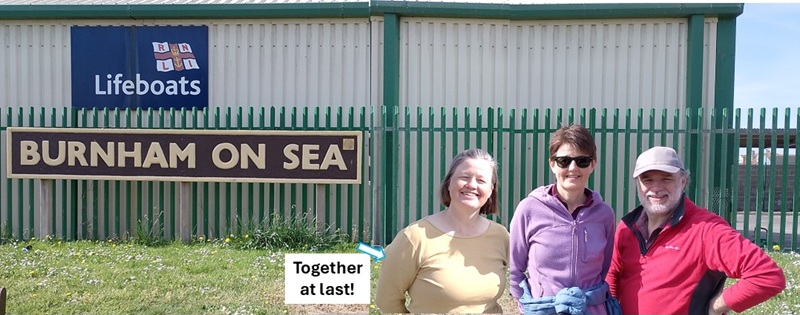
|
|
| This morning the tide was low in River Brue. The mud was thick and glistening, and the boats were stuck in the river bed. | |
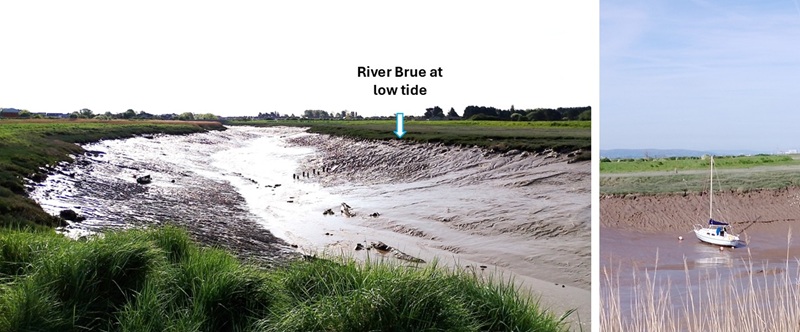
|
|
| A few days later we could compare the stuck versus the floating boats at the Burnham sailing club jetty. | |
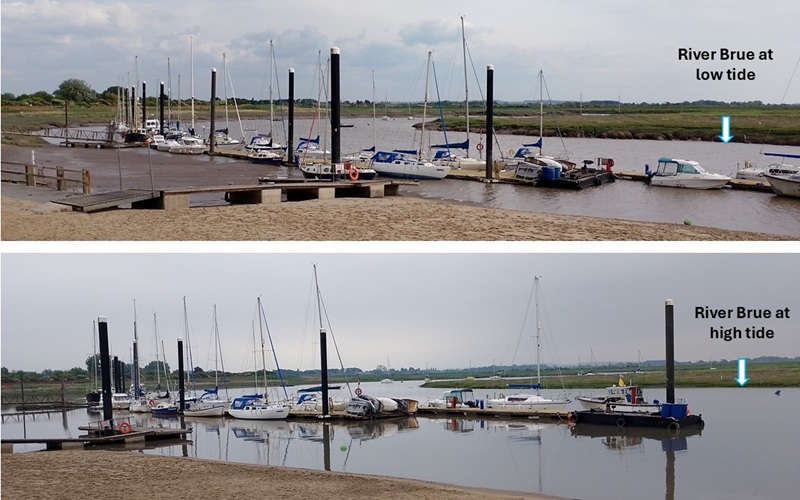
|
|
| We enjoyed a walk along the steps at the seafront. Later in the week you would get soggy feet if you walked on the bottom steps. In the video below we tried to capture the waves rolling along the bottom steps. | |
| The first tea break included Norwegian lefse for Rob and Hild and Wagon Wheels for Adelheid (her very favourite English snack). | |
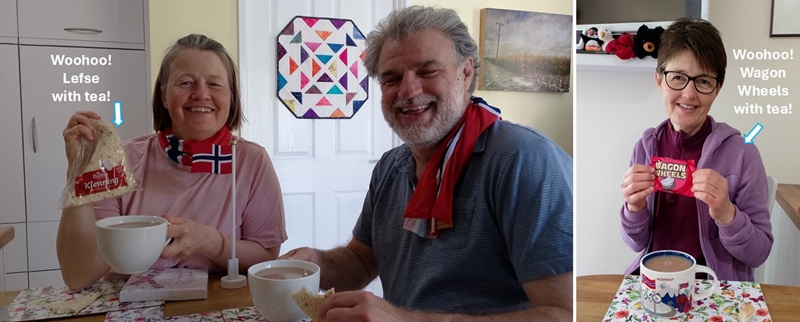
|
|
| The first hike we did together took us up the steep and long stairs to Brean Down. We stopped to take photos of the scenery and the many flowers along the path. While we already where hungry at the start, we made ourselves wait until we could enjoy a picnic with great views over Brean Beach. | |
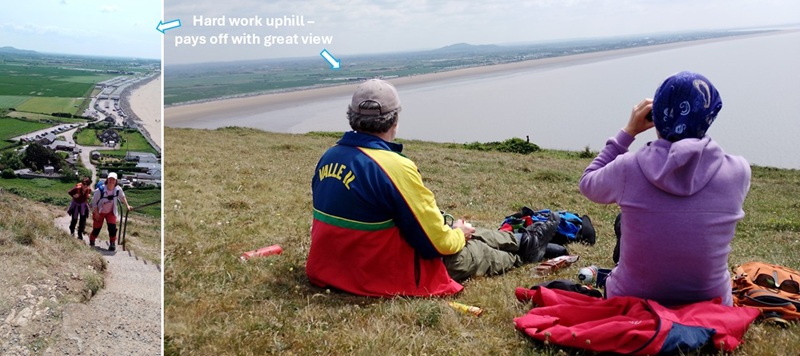
|
|
| When hiking Brean Down we could visit Brean Down Fort and explore the buildings and cannon emplacements. On clear days we can see Wales across the Bristol Channel. | |
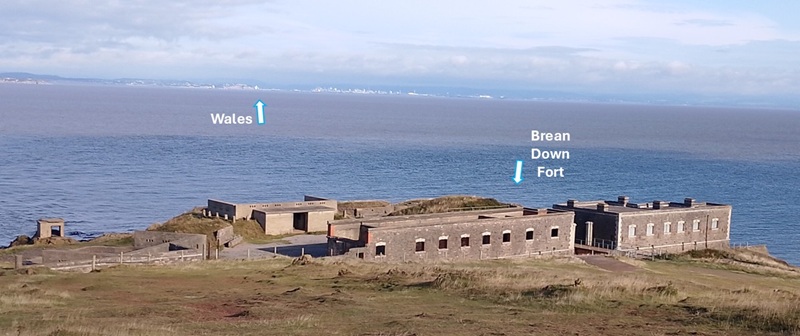
|
|
| The National Trust has erected several informational signs to educate the visiting masses. We enjoyed the one telling us of failed weapon experiments done during the Second World War. One bomb aimed for the sea, crashed shortly after launch. And one experiment landed in a chicken coop nearby. We are unsure if these were serious experiments or just a case of bored soldiers. | |
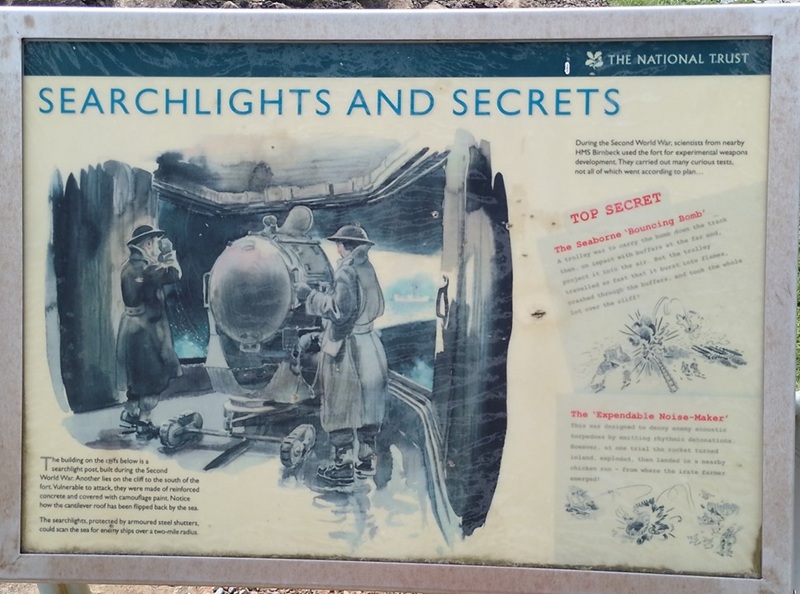
|
|
| Thanks to Adelheid's app (compared to a less trust-worthy Google-Lens) we were entertained by looking up the local spring flowers along the path. Veronicas, Cowslips, White Rock Roses, Anemones, Bird's-foot trefoils, Daisies, Thistles, Bluebells, and Buttercups. | |
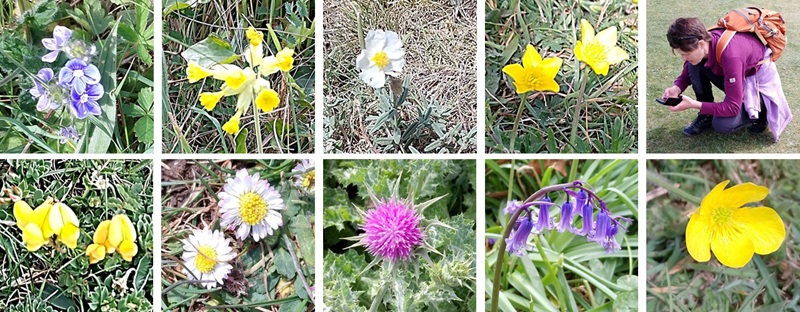
|
|
| During our walk we found cows grazing and enjoying the sunshine. As indicated on signs posted at the entrance to the park, they were wearing large collars that helps the farmer locate and fence them in by GPS. This is all familiar to Adelheid with the same system that Hege uses at her farm in Norway (https://grazingmap.nofence.no/). And it is a Norwegian business. Who would have thought! | |
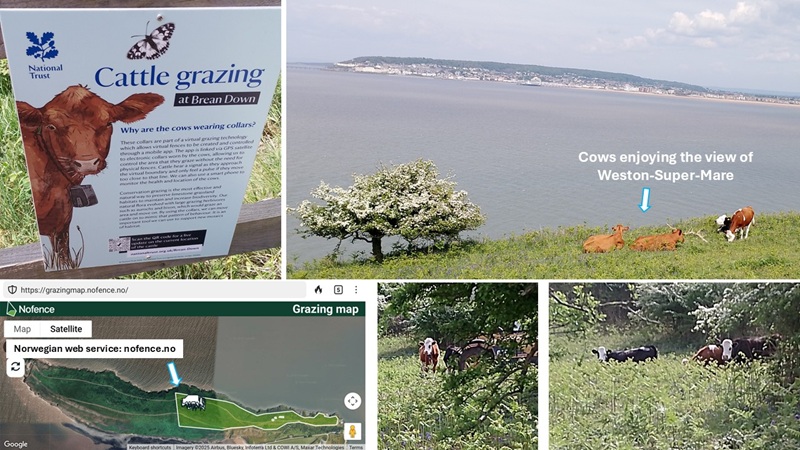
|
|
| Back at the carpark we enjoyed a rest - looking back up the steep hill to where we hours earlier had enjoyed our picnic lunch. | |
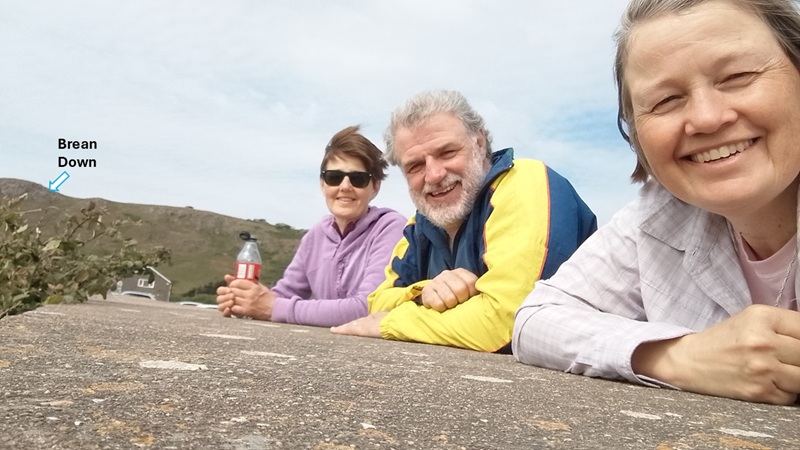
|
|
| After an afternoon of rest we travelled to the town of Cheddar nearby. This is where the Cheddar cheese comes from, and they even mature some of the cheeses in the local caves. We have yet to visit these caves. That will have to be later. This time around we explored the town's many beautiful buildings and Cheddar Yeo River. These sheep and goats were artistically made out of bushes and twigs. | |
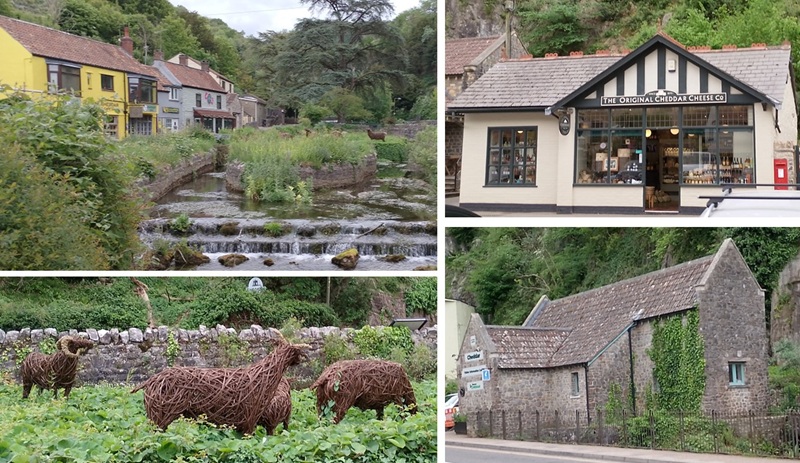
|
|
| We wanted to hike the Cheddar Gorge Rim Trail, and that is very steep at first. The climb is worth it when you get the view through the gorge out onto Cheddar and the Somerset Levels. | |
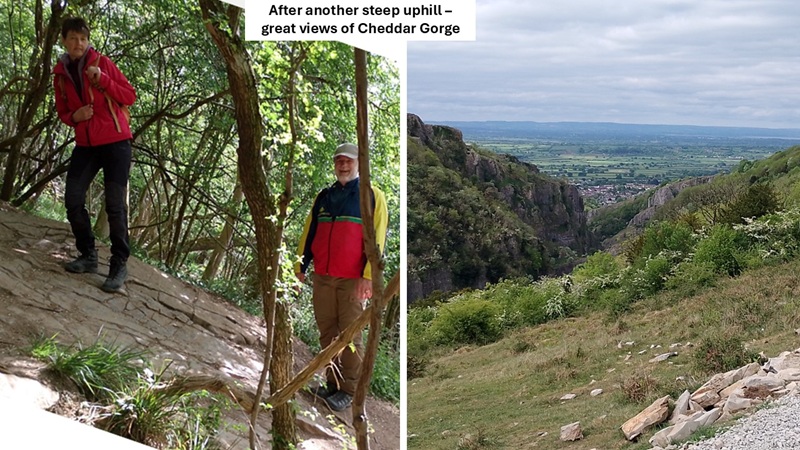
|
|
| So as not to make the hike easy, we then walked along the western rim, dropped down into the gorge/canyon, only to climb back up again the other side. Ugh! No surprise: we got a great view of Cheddar and its circular water reservoir. In the far distance we could spot Brent Knoll in direction of Burnham-on-Sea. | |
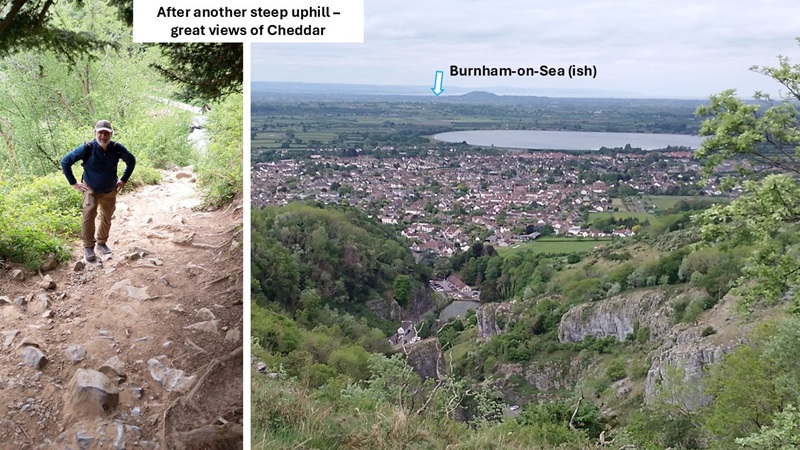
|
|
| It is also no surprise that we spent time looking for spring flowers and collecting photos of them all. Adelheid was particularly excited to find large areas of the forest floor covered in wild garlic (Norwegian: Ramslauk). Then there were Anemones, Daisies, Herb-Robert and Wild Strawberries. We also discovered that Herb-Robert is called "Stinking Bob" because the leaves do not smell nice. Sadly, we confirmed that fact! Ugh. | |
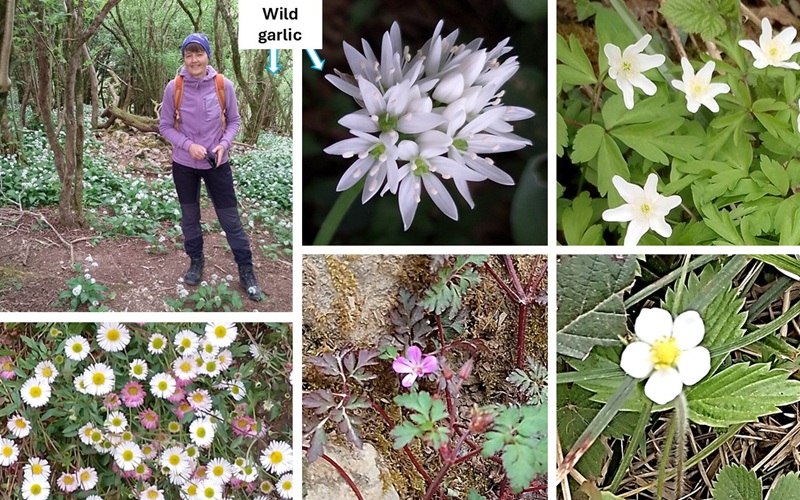
|
|
| As we crossed into the fields where wild goats are frequently found, we snuck though this very tall gate. It did not leave us much room to fit ourselves AND our backpacks. The size of the gate makes you feel like a small child. | |
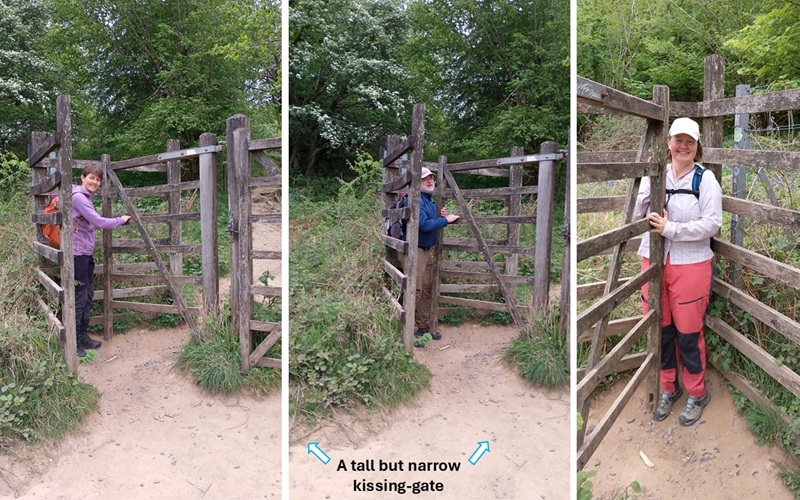
|
|
|
Sadly we were not able to get as close to the wild goats as we did last time.
It is probably because they have kids at this time of year.
We saw them in the forest but could not get good photos.
The view over Cheddar was nice to enjoy with our picnic lunch. A beautiful day again! | |
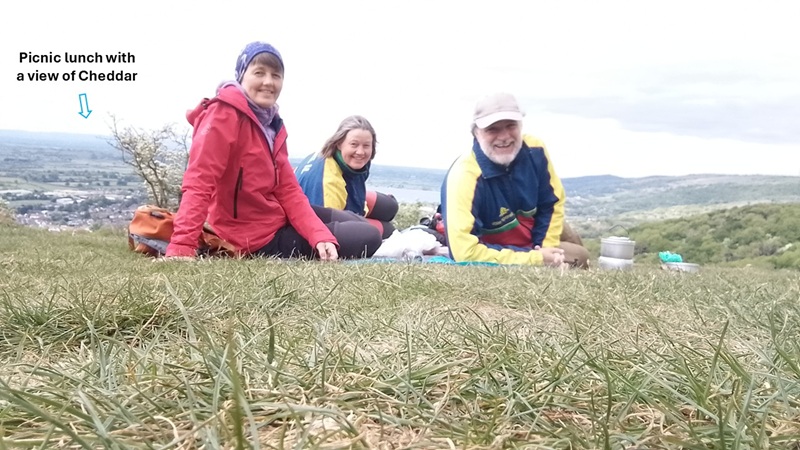
|
|
| Walking back into the town of Cheddar we got to experience more of their really narrow streets and stairs. We enjoyed how a home owner with no space along the road, converted his old coal cellar into a nook for his bins. | |
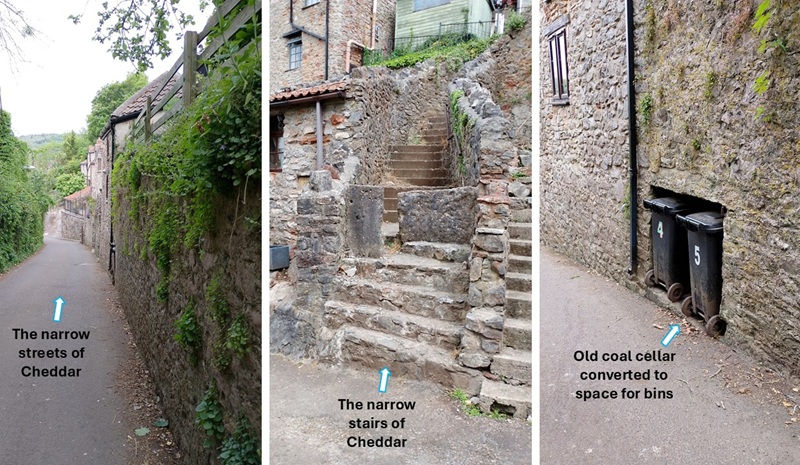
|
|
| There are a lot of bugs in the air, which means one needs to put some effort into cleaning the car's windshield. While Rob did his best, Adelheid, Hild, Wallace, Gromit, Shaun and Percy just sat there watching him.... how rude! | |
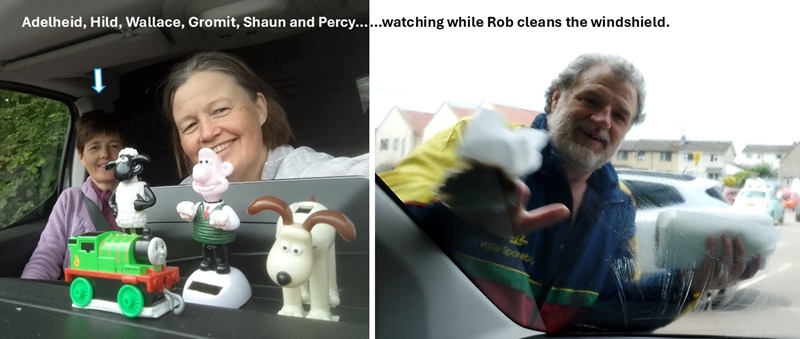
|
|
|
The next day we drove to Lynmouth and Lynton on the other side of Exmoor from
us. It is a beautiful little village with lots of shops, restaurants,
a funicular cliff railway, and many old buildings to look at.
We enjoyed looking at the boats in the harbour at low tide - including a lost-looking car... | |
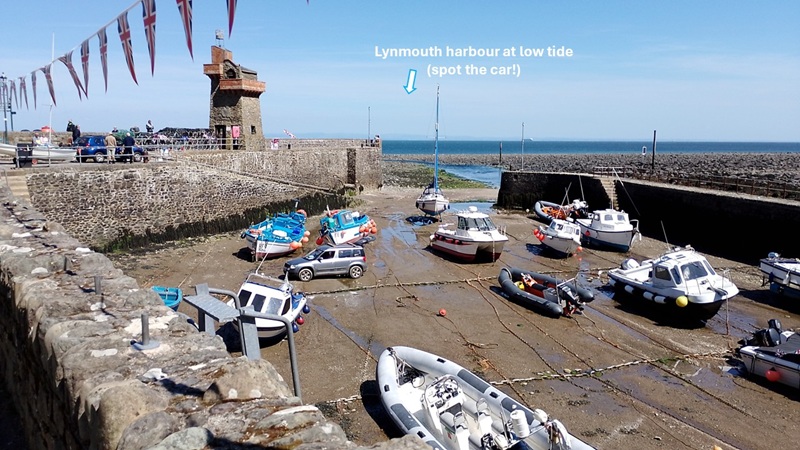
|
|
| We also discussed why they were building their retaining walls along the river by stacking the stones vertically. Still don't know why, but it looks cool. | |
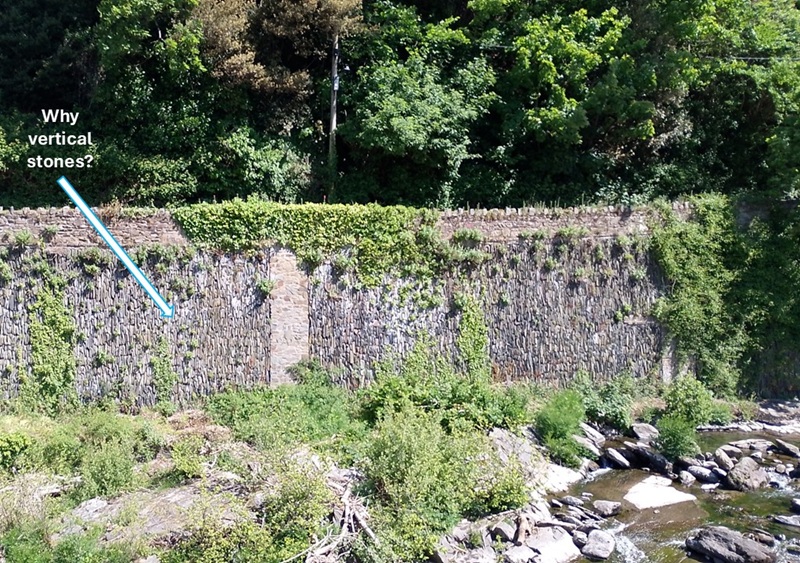
|
|
| Along the East Lyn River we spotted Lorna Doone House. Most Brits know about the books about Lorna Doone by R. D. Blackmore. Rob has now read it twice since moving to the area - even if the read is a bit of a slog. It is set in the late 17th century along the East Lyn Valley area of Exmoor. | |
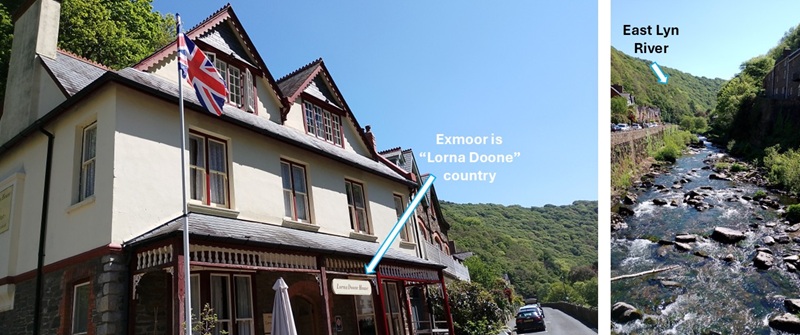
|
|
| The West Lyn River gorge was the centre of a deadly flood in 1952. Thirty four people died as fallen trees and debris formed a dam, which gave way and sent a huge wave down the valley. More than 100 buildings were destroyed or seriously damaged as well as 28 bridges and 38 cars. A small museum documents the event. It is well worth a visit. | |
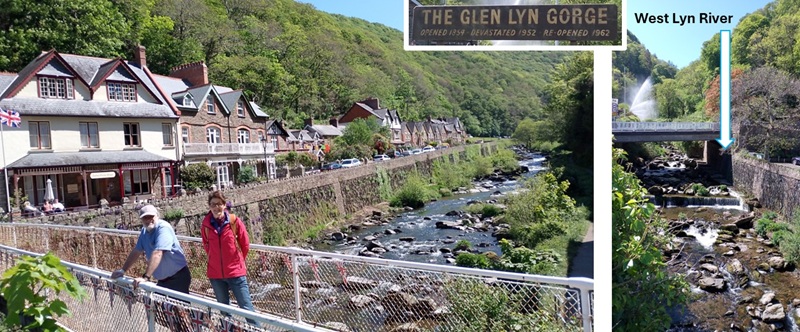
|
|
| Next we drove rather narrow and steep roads up through Lynton and onto Exmoor. We had hope to see sheep, cows, and wild ponies/horses like last time. However, we came away disappointed. A few ponies in the far distance was all we saw. At least we had another nice picnic lunch with a view over the moors. | |
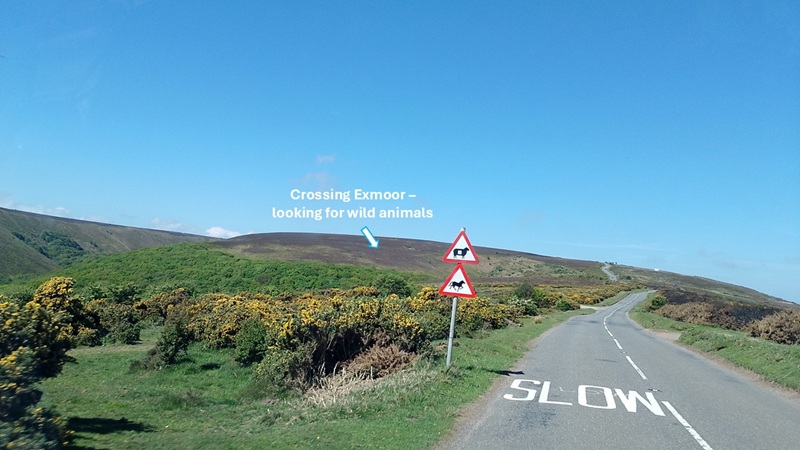
|
|
| Our route back home took us across the Quantock Hills. Here we had more luck seeing both sheep and horses/ponies. The horses had several foals so we kept our distance. | |
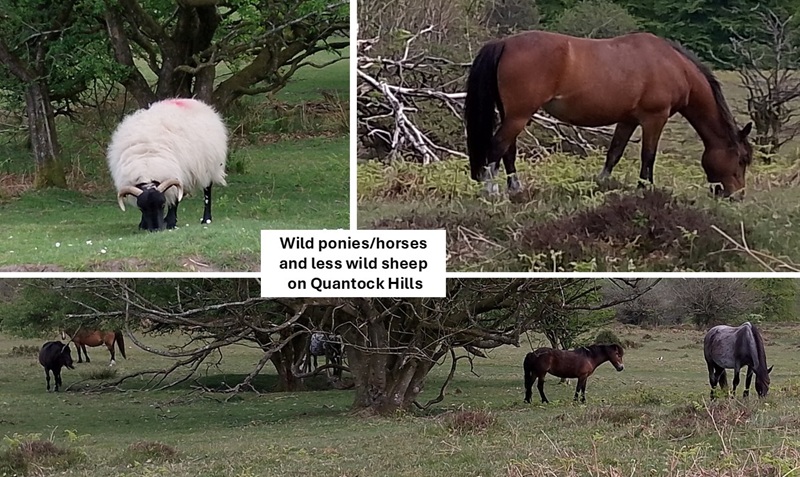
|
|
| The spooky forest of Quantock Hills was still there with its gnarly trees and windy roads. | |
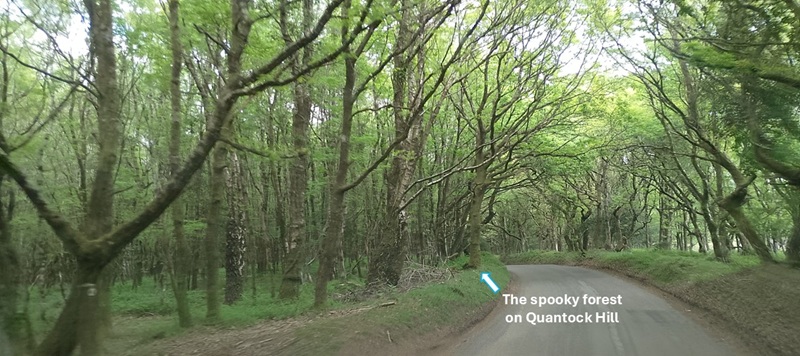
|
|
| Even in this rather remote place we came upon an ice cream truck. We weren't going to let the chance go by, so we enjoyed a "99 Flake" each (soft serve ice cream cone with a Cadbury Flake chocolate). | |
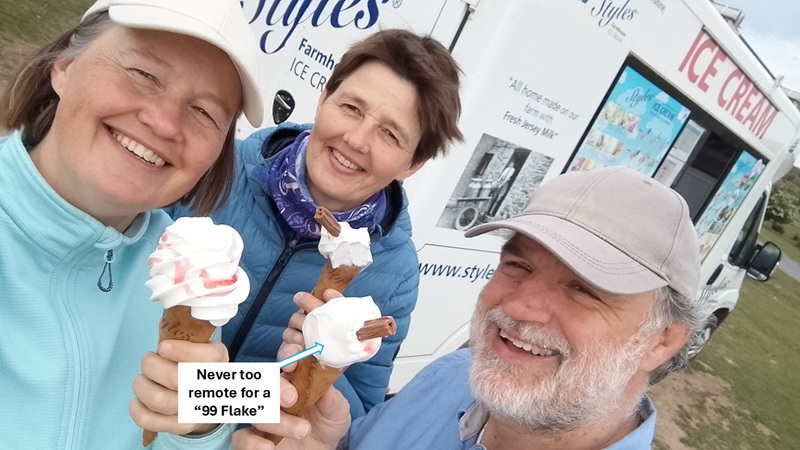
|
|
| After a week of fun we shared a farewell lunch with Liz at Rich's Cider Farm. The carvery has generous portions of meat and vegetables. Yes, we were hungry enough to finish our heaped plates - but there was no space for dessert... | |
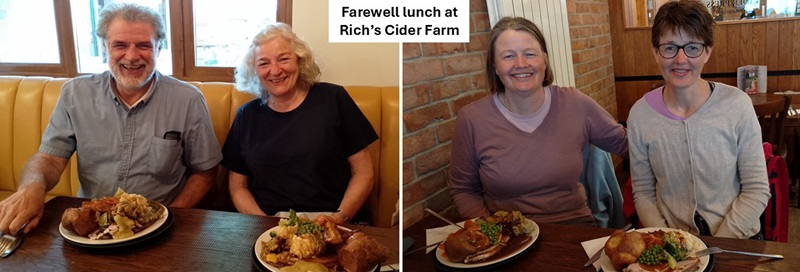
|
|
|
We'll end on a few peculiar things seen this week:
* DON'T PANIC! Car-arrester-bed provided along the road across Exmoor in case the car brakes fail. * PANIC! Is what we did when the local store announced that there were no more Penguin biscuits left - and they did not know when to expect more - EVER! Oh the Horror! | |
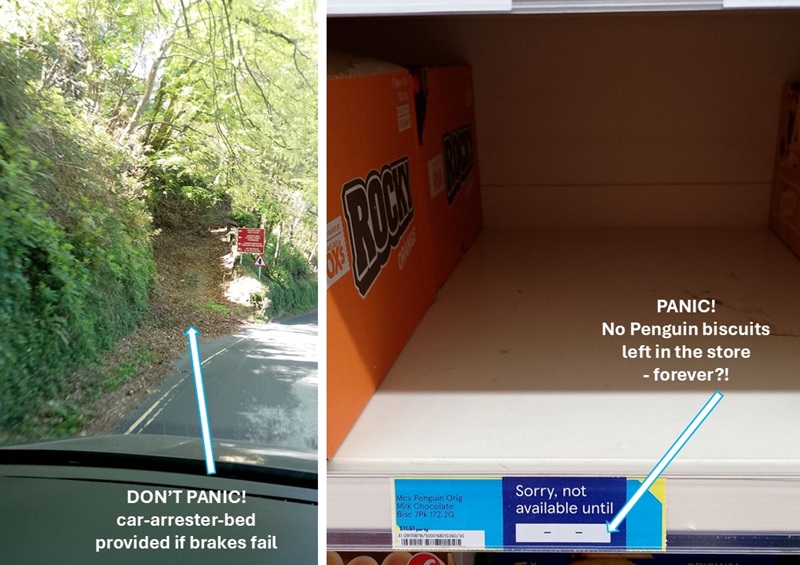
|
|
|
We had such a fun week together. Now all we can do is look forward to Adelheid's next visit. Hopefully soon. |
May 2025

